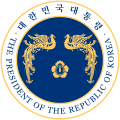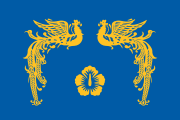Yun Posun
| Yun Posun | |
|---|---|
| 윤보선 | |
 | |
| 2nd President of South Korea | |
|
In office August 13, 1960 – March 22, 1962 | |
| Prime Minister |
Ho Chong Chang Myon Jang Do-young Song Yo-chan |
| Preceded by | Syngman Rhee |
| Succeeded by | Park Chung-hee |
| 5th Vice President of South Korea | |
|
In office April 23, 1960 – April 26, 1960 | |
| President | Syngman Rhee |
| Preceded by | Chang Myon |
| Succeeded by | Heo Jeong |
| Personal details | |
| Born |
August 26, 1897 Sinhang-ri, Dunpo-myeon, Asan County, South Chungcheong, Korea |
| Died |
July 18, 1990 (aged 92) Anguk-dong, Jongno District, Seoul, South Korea |
| Resting place | Yun Family Cemetery |
| Nationality | Republic of Korea |
| Political party | Democratic → New Democratic (1960) → New Democratic (1967) |
| Spouse(s) | Lady Min (1915?–1937), Gong Deok-gwi (1948–1990) |
| Children | 4 |
| Alma mater | University of Edinburgh (B.A., M.A.) |
| Religion | Presbyterianism |
| Signature |
 |
| Korean name | |
| Hangul | 윤보선 |
|---|---|
| Hanja | 尹潽善 |
| Revised Romanization | Yun Boseon |
| McCune–Reischauer | Yun Posŏn |
| Pen name | |
| Hangul | 해위 |
| Hanja | 海葦 |
| Revised Romanization | Haewi |
| McCune–Reischauer | Haewi |
| Courtesy name | |
| Hangul | 경천 |
| Hanja | 敬天 |
| Revised Romanization | Gyeongcheon |
| McCune–Reischauer | Kyŏngch'ŏn |
Yun Posun (Hangul: 윤보선; Hanja: 尹潽善; [jun bosʰʌn]; August 26, 1897 – July 18, 1990) was a Korean independence activist and politician, who served as the second President of South Korea from 1960 to 1962 before being replaced by the long-serving Park Chung-hee as a result of the May 16 coup in 1961.
Having entered politics after World War II, Yun served as Secretary to Korea's Chief of Staff in 1947; and was Mayor of Seoul in 1948. He served as Commerce Minister for the newly liberated Korea from 1949–1950. In 1955 Yun helped establish the South Korean Democratic Party.
Early life
Yun Posun was born in Dunpo-myeon, Asan, South Chungcheong Province in 1897. He was a son of Yun Chiso (윤치소, 1871–1944) and Lady Yi Beomsuk (이범숙, 1876–1969). Yun studied in the United Kingdom, graduating with a Master of Arts from the University of Edinburgh in 1930. He returned to Korea in 1932.
Political career
Yun entered politics in 1945 following Gwangbokjeol (Liberation Day). The first Doctor of Philosophy from Princeton University in Korea, as well as first President of South Korea, Dr. Syngman Rhee, was his mentor. By 1947, Yun was serving as Secretary to the Korean Chief of Staff. In 1948, Rhee appointed Yun to the position of mayor of Seoul. A year later, he was made Minister of Commerce and Industry. However, Yun soon began to disagree with Rhee's authoritarian policies.
While serving as president of the Red Cross Society, he was elected to the National Assembly in 1954. A year later, he co-founded the opposition South Korean Democratic Party. In 1959, he became a representative to the Supreme Council of the Democratic Party.
Short term presidency
Rhee's government was ousted by a student-led, pro-democracy uprising in 1960; and Yun was elected president on August 13, and appointed Chang Myon as First Minister. In response to the authoritarian excesses of Rhee's regime, South Korea had switched to a parliamentary system; so in fact Yun served merely as a figurehead.
Following Park Chung Hee's coup in 1961, Yun stayed in his post in order to provide some legitimacy to the new regime, but resigned on March 22, 1962. In the following years, Yun received suspended sentences several times for anti-government activities. He opposed Park's authoritarian rule[1] and ran for president twice, in 1963 and 1967, losing each time.
Yun retired from active politics in 1980 and focused his life on cultural activities until his death on July 18, 1990.[2]
Awards
- Grand Order of Mugunghwa (무궁화 대훈장)
- In-Cheon Cultural Award[3]
See also
- Yun Chi-ho
- Yun Chi-Oh
- Yun Chi-Young
- Chang Myon
- Jang Jun-ha
- South Korean presidential election, August 1960
- South Korean presidential election, 1963
- South Korean presidential election, 1967
References
- ↑ The Japan-Korea Normalization Process and Korean Anti-Americanism.
- ↑ "Yun Po Sun, 92, Dies; Ex-President of Korea". The New York Times. July 19, 1990.
- ↑ Note: The Kim Seong-su Memoriam
Further reading
- "Road of Thorns; The National Salvation"; autobiography; (구국의 가시밭길)》 (1967)
- "Select the Days of Lonely"; (외로운 선택의 나날들)》 (1991)
External links
| Wikimedia Commons has media related to Yun Bo-seon. |
- Official website (Korean)
- Papyeong Yun clan website
- Yun Posun at Heonjeonghoe (Korean)
- Yun Posun at Encyclopedia of Korean Culture (Korean)
| Political offices | ||
|---|---|---|
| Preceded by Heo Jeong (Acting) |
President of South Korea 1960–1962 |
Succeeded by Park Chung-hee |
| Preceded by Kim Hyung-min |
Mayor of Seoul City 1948–1949 |
Succeeded by Lee Ki-poong |
| Preceded by Lim Young-sin |
Commerce Minister of South Korea 1949–1950 |
Succeeded by Kim Hoon |

